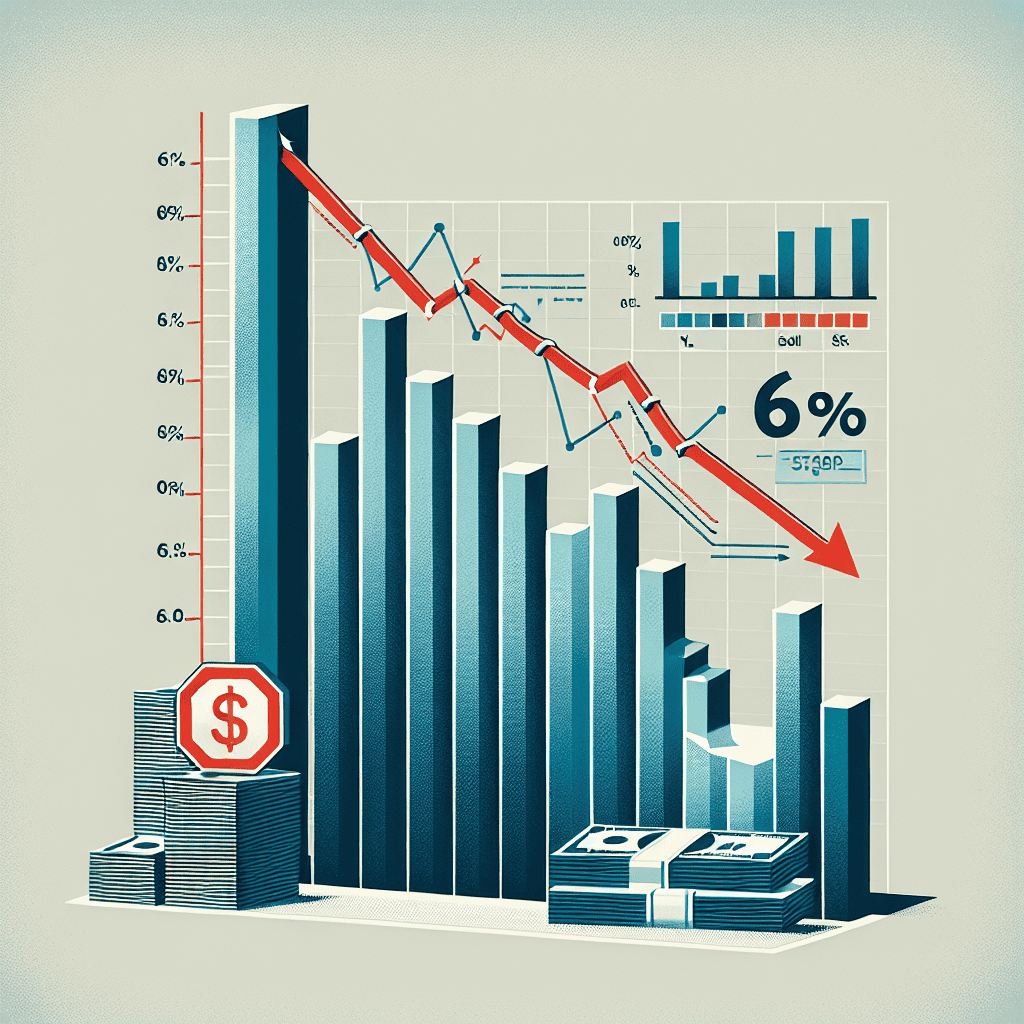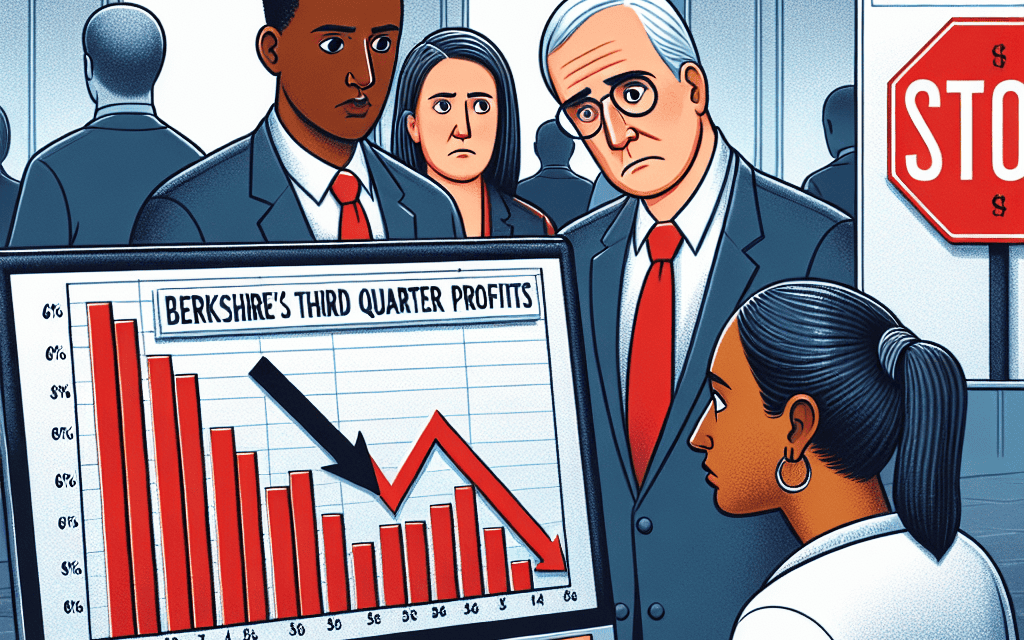“Berkshire’s Q3 Profits Dip 6% Amid Buyback Pause: Navigating Market Shifts”
Introduction
In the third quarter, Berkshire Hathaway reported a 6% decline in profits, marking a significant shift in its financial trajectory as the conglomerate paused its stock buyback program. The halt in buybacks, a strategy previously employed to bolster shareholder value, reflects a cautious approach amid fluctuating market conditions and economic uncertainties. This downturn in profits underscores the challenges faced by the multinational conglomerate, led by Warren Buffett, as it navigates a complex economic landscape while managing its diverse portfolio of businesses. The financial results highlight the impact of strategic decisions on the company’s bottom line and signal potential adjustments in its investment and operational strategies moving forward.
Analysis Of Berkshire’s Third Quarter Profit Decline
Berkshire Hathaway, the multinational conglomerate led by the renowned investor Warren Buffett, recently reported a 6% decline in its third-quarter profits, a development that has captured the attention of investors and analysts alike. This downturn in profitability is particularly noteworthy given the company’s historical performance and its reputation for steady financial growth. Several factors have contributed to this decline, with the cessation of stock buybacks being a significant element. Understanding the implications of these changes requires a closer examination of Berkshire’s financial strategies and the broader economic context.
To begin with, the halt in stock buybacks marks a strategic shift for Berkshire Hathaway. In recent years, buybacks have been a favored tool for the company to return value to shareholders, especially when it perceived its stock to be undervalued. By repurchasing its own shares, Berkshire effectively reduced the number of outstanding shares, thereby increasing the earnings per share and often boosting the stock price. However, the decision to pause buybacks suggests a reassessment of capital allocation priorities. This move could be interpreted as an indication that the company is either conserving cash for potential future investments or that it no longer views its stock as undervalued. Consequently, this shift has had a direct impact on the company’s reported earnings, contributing to the observed decline.
Moreover, the broader economic environment has also played a role in Berkshire’s reduced profitability. The third quarter of the year has been characterized by economic uncertainties, including fluctuating interest rates, inflationary pressures, and geopolitical tensions. These factors have created a challenging landscape for many businesses, including those within Berkshire’s diverse portfolio. For instance, rising interest rates can increase borrowing costs, thereby affecting the profitability of companies reliant on debt financing. Additionally, inflation can erode consumer purchasing power, potentially leading to reduced demand for goods and services offered by Berkshire’s subsidiaries.
Furthermore, it is essential to consider the performance of Berkshire’s key business segments. The conglomerate’s operations span a wide range of industries, including insurance, energy, transportation, and consumer goods. Each of these sectors has faced its own set of challenges in the current economic climate. For example, the insurance sector has been impacted by an increase in claims due to natural disasters, while the energy sector has experienced volatility in commodity prices. These sector-specific issues have undoubtedly contributed to the overall decline in Berkshire’s profitability.
Despite these challenges, it is important to recognize that Berkshire Hathaway remains a financially robust entity with a strong balance sheet. The company’s vast cash reserves provide it with the flexibility to navigate economic uncertainties and seize potential investment opportunities. Additionally, Warren Buffett’s long-term investment philosophy, which emphasizes value investing and patience, continues to guide the company’s strategic decisions. This approach has historically enabled Berkshire to weather economic downturns and emerge stronger in the long run.
In conclusion, the 6% drop in Berkshire Hathaway’s third-quarter profits can be attributed to a combination of internal strategic decisions and external economic factors. The halt in stock buybacks reflects a shift in capital allocation priorities, while the challenging economic environment has posed additional hurdles for the company’s diverse business segments. Nevertheless, Berkshire’s strong financial foundation and prudent investment strategy position it well to adapt to changing market conditions and pursue future growth opportunities. As such, while the current profit decline is notable, it is not necessarily indicative of long-term financial weakness.
Impact Of Halting Buybacks On Berkshire’s Financial Strategy
Berkshire Hathaway, the multinational conglomerate led by the renowned investor Warren Buffett, recently reported a 6% decline in its third-quarter profits, a development that has sparked considerable interest among investors and analysts alike. This downturn is particularly noteworthy as it coincides with the company’s decision to halt its share buyback program, a strategic move that has been a significant component of its financial strategy in recent years. Understanding the implications of this decision requires a closer examination of how buybacks have historically influenced Berkshire’s financial performance and the potential reasons behind this strategic shift.
Share buybacks have long been a favored tool for companies seeking to return value to shareholders. By repurchasing its own shares, a company can reduce the number of outstanding shares, thereby increasing the value of remaining shares and often boosting earnings per share (EPS). For Berkshire Hathaway, buybacks have served as a flexible mechanism to deploy excess capital, especially when attractive acquisition opportunities were scarce. This approach has been particularly beneficial in maintaining shareholder value during periods of market volatility or when the company’s stock was perceived to be undervalued.
However, the decision to halt buybacks suggests a recalibration of Berkshire’s financial strategy. One possible explanation for this shift could be the current valuation of Berkshire’s stock. If Buffett and his team believe that the stock is no longer undervalued, they may opt to conserve capital for other investment opportunities that promise higher returns. Additionally, the broader economic environment, characterized by rising interest rates and inflationary pressures, may have influenced this decision. In such a climate, preserving liquidity and maintaining a strong balance sheet could be prioritized over buybacks.
Moreover, the halt in buybacks may also reflect a strategic pivot towards more significant investments or acquisitions. Berkshire Hathaway has a storied history of acquiring companies that align with its long-term investment philosophy, and the current economic landscape might present unique opportunities for such ventures. By conserving capital, Berkshire positions itself to act swiftly and decisively when attractive acquisition targets emerge, potentially enhancing its portfolio and driving future growth.
The impact of halting buybacks on Berkshire’s financial strategy extends beyond immediate profit figures. It signals a potential shift in how the company allocates capital and manages shareholder expectations. While some investors may view the cessation of buybacks as a negative development, others might interpret it as a prudent move that underscores Berkshire’s commitment to disciplined capital management. This strategic flexibility is a hallmark of Buffett’s investment approach, which emphasizes long-term value creation over short-term gains.
In conclusion, the 6% drop in Berkshire Hathaway’s third-quarter profits, coupled with the decision to halt share buybacks, offers a glimpse into the evolving dynamics of the company’s financial strategy. While the immediate impact on profits is evident, the broader implications of this decision highlight Berkshire’s adaptability in navigating complex market conditions. As the company continues to assess its strategic priorities, investors will be keenly observing how these decisions influence Berkshire’s performance and its ability to capitalize on future opportunities. Ultimately, the halt in buybacks may well be a calculated move that positions Berkshire for sustained success in an ever-changing economic landscape.
Factors Contributing To Berkshire’s 6% Profit Drop
Berkshire Hathaway, the multinational conglomerate led by the renowned investor Warren Buffett, recently reported a 6% decline in its third-quarter profits, a development that has captured the attention of investors and analysts alike. This downturn in profitability can be attributed to a confluence of factors, each playing a significant role in shaping the financial landscape of the company during this period. Understanding these factors provides valuable insights into the challenges and strategic decisions faced by Berkshire Hathaway.
One of the primary contributors to the decline in profits is the halt in share buybacks, a strategy that Berkshire has employed in recent years to return value to shareholders. Share buybacks have the effect of reducing the number of outstanding shares, thereby increasing earnings per share and often boosting the stock price. However, during the third quarter, Berkshire chose to pause this activity, a decision that may have been influenced by the company’s assessment of its stock valuation or the need to preserve cash for other strategic investments. The absence of buybacks not only impacted the earnings per share but also signaled a shift in the company’s capital allocation strategy, which may have contributed to investor apprehension.
In addition to the cessation of buybacks, Berkshire’s diverse portfolio of businesses faced varying degrees of pressure from external economic conditions. The conglomerate’s insurance operations, which include well-known entities such as GEICO, experienced challenges due to rising claims costs and competitive pressures. The insurance sector, being highly sensitive to economic fluctuations, saw increased claims expenses, which in turn squeezed profit margins. Furthermore, the broader economic environment, characterized by inflationary pressures and supply chain disruptions, added to the operational challenges faced by Berkshire’s subsidiaries.
Moreover, the performance of Berkshire’s equity investments also played a role in the profit decline. The company’s substantial holdings in publicly traded companies, including major stakes in Apple, Bank of America, and Coca-Cola, are subject to market volatility. During the third quarter, fluctuations in the stock market, driven by concerns over interest rate hikes and geopolitical tensions, affected the valuation of these investments. Consequently, the unrealized gains or losses on these equity holdings had a direct impact on Berkshire’s reported earnings, contributing to the overall decline.
Another factor to consider is the strategic acquisitions and investments made by Berkshire Hathaway. While the company is known for its prudent investment approach, the timing and integration of new acquisitions can influence short-term profitability. The costs associated with integrating new businesses, coupled with the time required to realize synergies, can temporarily weigh on earnings. As Berkshire continues to seek opportunities for growth and diversification, these transitional phases are an inherent part of its long-term strategy.
In conclusion, the 6% drop in Berkshire Hathaway’s third-quarter profits is the result of a complex interplay of factors, including the halt in share buybacks, challenges within its insurance operations, market volatility affecting its equity investments, and the integration of new acquisitions. While these elements have collectively impacted the company’s short-term financial performance, they also reflect the dynamic nature of Berkshire’s business environment. As the conglomerate navigates these challenges, its strategic decisions and adaptability will be crucial in shaping its future trajectory and maintaining its reputation as a stalwart in the investment world.
Warren Buffett’s Perspective On Recent Profit Trends

In the third quarter of 2023, Berkshire Hathaway, the multinational conglomerate led by the venerable Warren Buffett, reported a 6% decline in profits, a development that has captured the attention of investors and analysts alike. This downturn in profitability, while notable, is not entirely unexpected given the broader economic context and the strategic decisions made by the company in recent months. As we delve into the factors contributing to this decline, it is essential to consider Buffett’s perspective on these trends and the implications for Berkshire’s future.
One of the primary reasons for the dip in profits is the halt in share buybacks, a strategy that Berkshire has employed in the past to return value to shareholders. Share buybacks can often bolster earnings per share by reducing the number of outstanding shares, thus enhancing shareholder value. However, Buffett has always been judicious in his approach to buybacks, opting to repurchase shares only when he believes they are undervalued. In recent quarters, the valuation of Berkshire’s stock may not have met Buffett’s criteria for buybacks, leading to a pause in this activity. This decision underscores Buffett’s long-standing commitment to value investing principles, prioritizing long-term growth over short-term gains.
Moreover, the broader economic environment has posed challenges for many businesses, including those within Berkshire’s diverse portfolio. Rising interest rates, inflationary pressures, and geopolitical uncertainties have created a complex landscape for companies to navigate. These factors have inevitably impacted the performance of some of Berkshire’s subsidiaries, contributing to the overall decline in profits. Nevertheless, Buffett’s investment philosophy, which emphasizes resilience and adaptability, suggests that Berkshire is well-positioned to weather these challenges. His focus on acquiring and holding businesses with strong fundamentals and competitive advantages remains a cornerstone of the conglomerate’s strategy.
In addition to external economic factors, internal dynamics within Berkshire have also played a role in shaping recent profit trends. The conglomerate’s vast array of businesses, spanning industries such as insurance, energy, transportation, and consumer goods, means that its financial performance is influenced by a multitude of variables. While some sectors have experienced headwinds, others have shown resilience and growth. For instance, Berkshire’s insurance operations have continued to perform robustly, providing a stable source of income amidst volatility in other areas. This diversification is a testament to Buffett’s strategic foresight in building a conglomerate that can thrive across economic cycles.
Looking ahead, Buffett’s perspective on the current profit trends is likely one of cautious optimism. While acknowledging the challenges that lie ahead, he remains confident in Berkshire’s ability to adapt and grow. His emphasis on maintaining a strong balance sheet and a disciplined approach to capital allocation ensures that the company is well-equipped to seize opportunities as they arise. Furthermore, Buffett’s long-term vision for Berkshire, which prioritizes sustainable growth and shareholder value, remains unchanged.
In conclusion, the 6% drop in Berkshire’s third-quarter profits reflects a confluence of factors, both external and internal. However, under Warren Buffett’s astute leadership, the conglomerate is poised to navigate these challenges with resilience and strategic acumen. As investors and analysts continue to scrutinize Berkshire’s performance, Buffett’s unwavering commitment to value investing and long-term growth serves as a guiding principle for the company’s future trajectory.
Market Reactions To Berkshire’s Third Quarter Earnings Report
Berkshire Hathaway, the multinational conglomerate led by the renowned investor Warren Buffett, recently reported a 6% decline in its third-quarter profits, a development that has captured the attention of market analysts and investors alike. This downturn in profitability has been attributed to a combination of factors, including a halt in the company’s stock buyback program, which had previously been a significant driver of shareholder value. As the market digests this news, reactions have been varied, reflecting the complex interplay of expectations and realities that characterize the financial landscape.
To begin with, the cessation of Berkshire’s stock buybacks has been a focal point for many observers. Stock buybacks, or repurchases, have been a popular strategy among corporations to return capital to shareholders, often leading to an increase in earnings per share by reducing the number of outstanding shares. For Berkshire, buybacks have been a tool to deploy excess cash in a manner that directly benefits shareholders, especially when the company’s stock is perceived to be undervalued. However, the decision to halt buybacks suggests a shift in Berkshire’s capital allocation strategy, possibly indicating that the company is prioritizing other investment opportunities or conserving cash in anticipation of future market conditions.
Moreover, the broader economic environment has undoubtedly played a role in Berkshire’s recent performance. The third quarter of the year has been marked by persistent inflationary pressures, fluctuating interest rates, and geopolitical uncertainties, all of which have contributed to a challenging operating environment for businesses across various sectors. For Berkshire, which has a diverse portfolio spanning insurance, utilities, manufacturing, and retail, these macroeconomic factors have likely impacted its subsidiaries’ earnings, thereby affecting the conglomerate’s overall profitability.
In addition to these external factors, internal dynamics within Berkshire’s vast array of businesses may have also influenced the quarterly results. The company’s insurance operations, for instance, are a significant component of its earnings, and fluctuations in underwriting results or investment income can have a pronounced effect on overall profitability. Similarly, the performance of Berkshire’s equity investments, which include substantial stakes in companies like Apple and Coca-Cola, can be subject to market volatility, further complicating the earnings picture.
As investors and analysts assess the implications of Berkshire’s third-quarter earnings report, the market’s reaction has been one of cautious reflection. On one hand, the decline in profits and the halt in buybacks may raise concerns about the company’s near-term growth prospects and its ability to navigate an uncertain economic landscape. On the other hand, Berkshire’s long-standing reputation for prudent management and its substantial cash reserves provide a measure of reassurance, suggesting that the company is well-positioned to capitalize on opportunities as they arise.
In conclusion, while Berkshire Hathaway’s third-quarter earnings report has highlighted some challenges, it also underscores the resilience and adaptability that have long been hallmarks of the conglomerate. As the market continues to react to these developments, investors will be keenly watching for any further insights from Warren Buffett and his team regarding the company’s strategic direction and their outlook on the evolving economic environment. Ultimately, the interplay between short-term market reactions and long-term investment strategies will continue to shape the narrative surrounding Berkshire Hathaway and its place in the global financial landscape.
Long-Term Implications Of Berkshire’s Buyback Suspension
Berkshire Hathaway’s recent announcement of a 6% drop in third-quarter profits has sparked considerable discussion among investors and analysts, particularly in light of the company’s decision to halt its stock buyback program. This development raises important questions about the long-term implications for the conglomerate, which has long been a bellwether for broader economic trends. The suspension of buybacks, a strategy that has been a significant component of Berkshire’s capital allocation in recent years, signals a potential shift in the company’s approach to managing its vast resources.
To understand the broader impact of this decision, it is essential to consider the role that stock buybacks have played in Berkshire’s financial strategy. Buybacks have been a tool for returning capital to shareholders, effectively increasing the value of remaining shares by reducing the total number outstanding. This approach has been particularly appealing in periods of low interest rates, where alternative investment opportunities may not offer comparable returns. However, the decision to suspend buybacks suggests that Berkshire may be reassessing its priorities in response to changing market conditions.
One possible interpretation of this move is that Berkshire is positioning itself to capitalize on new investment opportunities. With interest rates on the rise and economic uncertainty looming, the company may be conserving cash to deploy in more lucrative ventures. This strategy aligns with Warren Buffett’s long-standing philosophy of seeking value investments, particularly during times of market volatility. By holding onto its cash reserves, Berkshire could be preparing to make significant acquisitions or investments that could drive long-term growth.
Moreover, the halt in buybacks may also reflect a broader cautionary stance in response to macroeconomic challenges. Inflationary pressures, supply chain disruptions, and geopolitical tensions have created a complex environment for businesses worldwide. In such a context, maintaining financial flexibility becomes paramount. By suspending buybacks, Berkshire ensures that it retains the liquidity necessary to navigate potential headwinds and seize opportunities as they arise.
Additionally, this decision could have implications for Berkshire’s shareholder base. While buybacks have been a popular method of returning value to shareholders, their suspension may prompt some investors to reevaluate their positions. However, it is important to note that Berkshire’s reputation for prudent management and its diverse portfolio of businesses continue to make it an attractive long-term investment. The company’s ability to adapt to changing circumstances and its focus on sustainable growth are likely to reassure investors who prioritize stability over short-term gains.
In conclusion, Berkshire Hathaway’s decision to halt its stock buyback program amid a 6% drop in third-quarter profits is a significant development with potential long-term implications. While the immediate impact may be a source of concern for some investors, the move could ultimately position the company for future success. By conserving cash and maintaining financial flexibility, Berkshire is well-equipped to navigate the challenges and opportunities that lie ahead. As the economic landscape continues to evolve, the company’s strategic decisions will undoubtedly be closely watched by those seeking insight into broader market trends.
Comparing Berkshire’s Performance With Industry Peers In Q3
In the third quarter of 2023, Berkshire Hathaway reported a 6% decline in profits, a development that has drawn significant attention from investors and analysts alike. This downturn is particularly noteworthy given the conglomerate’s historical resilience and robust performance across various economic cycles. To better understand the implications of this decline, it is essential to compare Berkshire’s performance with that of its industry peers during the same period. By doing so, we can gain insights into whether this dip is an isolated incident or part of a broader trend affecting similar companies.
Berkshire Hathaway, led by the venerable Warren Buffett, has long been a bellwether in the investment community. Its diverse portfolio, which spans insurance, railroads, utilities, and consumer goods, typically provides a buffer against sector-specific downturns. However, the third quarter of 2023 presented unique challenges. The halt in share buybacks, a strategy that has previously bolstered earnings per share, played a significant role in the profit decline. This decision, while prudent in preserving cash for potential future investments, contrasts with the actions of some industry peers who continued aggressive buyback programs to support their stock prices.
In comparison, other major conglomerates and investment firms faced similar headwinds but employed different strategies to mitigate their impact. For instance, companies like BlackRock and JPMorgan Chase reported stable or slightly increased profits, largely due to their continued focus on expanding their asset management and financial services divisions. These firms capitalized on rising interest rates, which boosted their net interest income, a factor that did not significantly benefit Berkshire due to its different business model.
Moreover, the broader economic environment in the third quarter posed challenges that affected many in the industry. Inflationary pressures, geopolitical tensions, and fluctuating commodity prices created a complex landscape for businesses to navigate. While some companies managed to pass increased costs onto consumers, thereby maintaining their profit margins, Berkshire’s diverse holdings meant that not all its subsidiaries could do so effectively. This disparity highlights the importance of strategic agility and sector-specific strategies in weathering economic volatility.
Furthermore, the insurance sector, a significant component of Berkshire’s portfolio, faced its own set of challenges. Natural disasters and increased claims activity during the quarter put pressure on underwriting profits. In contrast, some peers with a more concentrated focus on reinsurance or specialty insurance lines managed to offset these pressures through strategic pricing adjustments and risk management practices.
Despite these challenges, it is crucial to recognize that Berkshire Hathaway’s long-term investment philosophy and diversified portfolio position it well for future recovery and growth. The company’s decision to halt buybacks, while impacting short-term profits, reflects a cautious approach that may yield benefits in the long run, especially if market conditions present attractive acquisition opportunities.
In conclusion, while Berkshire Hathaway’s 6% profit decline in the third quarter of 2023 is notable, it is not entirely indicative of a systemic issue within the company. By comparing its performance with industry peers, it becomes evident that a combination of strategic decisions and external economic factors contributed to this outcome. As the company navigates these challenges, its historical resilience and strategic foresight remain key assets in maintaining its competitive edge in the ever-evolving investment landscape.
Q&A
1. **What caused Berkshire Hathaway’s third-quarter profits to drop by 6%?**
The drop in profits was primarily due to a halt in stock buybacks and potential impacts from market fluctuations or operational challenges.
2. **How did the halt in buybacks affect Berkshire Hathaway’s financial performance?**
The halt in buybacks likely reduced the company’s ability to return capital to shareholders, impacting overall financial performance and investor sentiment.
3. **What are stock buybacks, and why might a company halt them?**
Stock buybacks are when a company repurchases its own shares from the marketplace, reducing the number of outstanding shares. A company might halt buybacks to conserve cash, invest in other opportunities, or due to regulatory or strategic reasons.
4. **How significant are stock buybacks to Berkshire Hathaway’s overall strategy?**
Stock buybacks have been a significant part of Berkshire Hathaway’s strategy to return value to shareholders, especially when the company believes its shares are undervalued.
5. **What other factors could have contributed to the profit decline besides the halt in buybacks?**
Other factors could include changes in investment portfolio performance, operational costs, or economic conditions affecting its diverse range of businesses.
6. **How might investors react to the news of a profit decline and halted buybacks?**
Investors might react negatively due to concerns about future growth prospects and the company’s ability to generate shareholder value, potentially leading to a decrease in stock price.
7. **What steps could Berkshire Hathaway take to address the profit decline?**
Berkshire Hathaway could focus on improving operational efficiencies, exploring new investment opportunities, or resuming buybacks if conditions become favorable.
Conclusion
Berkshire Hathaway’s third-quarter profits experienced a 6% decline, primarily attributed to the cessation of its stock buyback program. The halt in buybacks, which had previously supported the company’s earnings per share by reducing the number of outstanding shares, suggests a strategic shift in capital allocation. This decision may reflect Berkshire’s assessment of market conditions or a reallocation of resources towards other investment opportunities. The drop in profits highlights the impact of buyback activities on financial performance and raises questions about future strategies for maintaining shareholder value.





